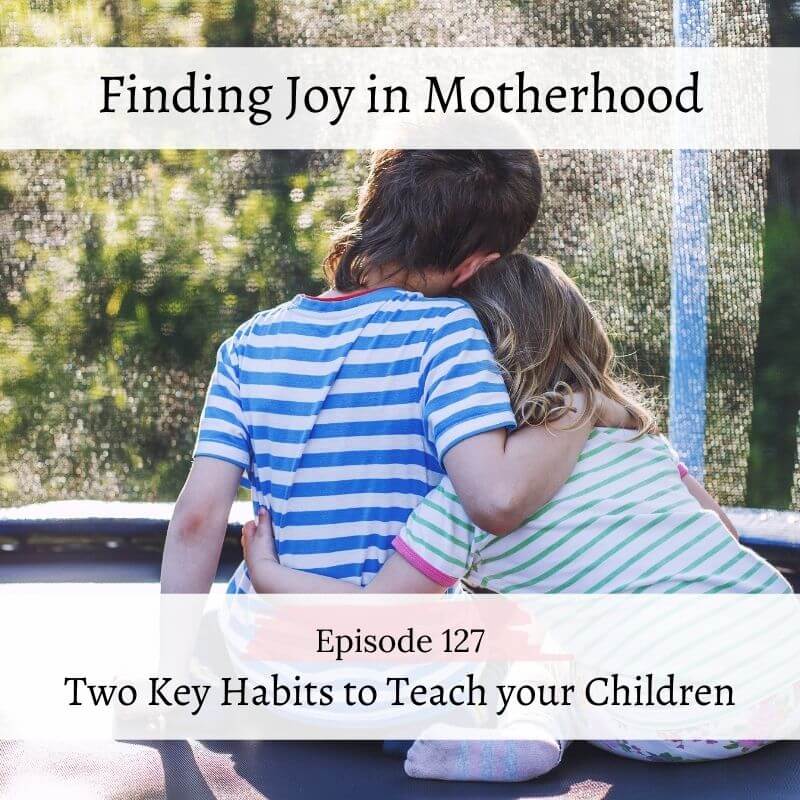Love What You’re Hearing and Want More?
Sign up to join the waitlist for Reimagine Motherhood, my monthly coaching program. I give practical tools and help you make mindset shifts to create the marriage, motherhood, and home you’ve always wanted.
Notes from this Episode:
Background
- Two key habits that are very important to teach to children are empathy and order.
Empathy
- Sometimes we forget our children come into the world knowing next to nothing.
- Some children’s tendencies move them towards certain virtues, but it is our beautiful privilege to nurture and tend to the virtues that do not come easily.
- Empathy is understanding and being aware of, or being sensitive to, the feelings of another without actually having the feeling yourself.
- Teaching empathy helps our children at any age to connect with the feelings and needs of others.
Here are some practical ways to teach your children:
- When children are playing and a child is hurt, encourage your child to be proactive and ask if the other is okay, rather than ignoring the hurt child.
- If your child takes a toy away from another child or sibling, help your child by putting themselves in the place of the other child and ask how they would feel if a toy was taken from them.
- If you have a sassy child, instead of always saying, “Speak nicely”, tell your child that it hurts people’s feelings when they are spoken to rudely.
- Encourage your child to seek out the new kid in the playgroup, classroom, or neighborhood.
Modeling Empathy
- Empathy developed in early childhood will go a long way during the difficult teen years when so many are just cruel to each other.
- Rather than a “survival of the fittest” mentality, we want to teach our children to be concerned about the weak and struggling, to be kind to all.
- The more children can imagine how they would feel, the more they will be compassionate, forgiving, and generous to others.
- Modeling empathy for our children is an even better tool than only talking about it – your children will greatly benefit from watching their mom also work at developing a specific virtue.
Order
- Children should have self-care routines:
- In the morning, when they get out of bed (even in the summer), they should immediately turn around and make their bed.
- After breakfast, they should clean up their dishes, brush their teeth, and get ready for the day.
- Children should also have daily routines:
- They should have time to play outside, as well as structured and consistent quiet time each day, and finally, a set bedtime.
- Insist upon a set and consistent nap/quiet time, depending on their age. Remember, you are the boss, not the two year-old who does not want to take a nap.
- Outside time is critical to little bodies. It will help burn off all the distracting energy and make them happy and tired.
- They should be able to have order in home care:
- No food outside the kitchen.
- Set “clean-up” times and chores.
- Impress upon your children from the time they are very young that it is their home too, and you are not the maid.
- It is imperative that you teach your child to have an active faith life and that it is the first order of the day.
- If actively praying throughout the day is not something you are doing, then you can teach them while challenging yourself to keep God first in mind and heart.
- Teach everyone a daily morning offering, prayers before meals, and encourage praying together as a family.
- It is also important to teach your child to be in relationship with God and aware that every blessing comes from Him and every sorrow can be soothed and comforted by Him.
Final Thoughts
- Empathy and order are not the only habits that children need to be happy, but if you can begin developing these habits early (start when they are toddlers!), you will be on your way to developing happy, kind, orderly children who will contribute to the peace and joy of the home

